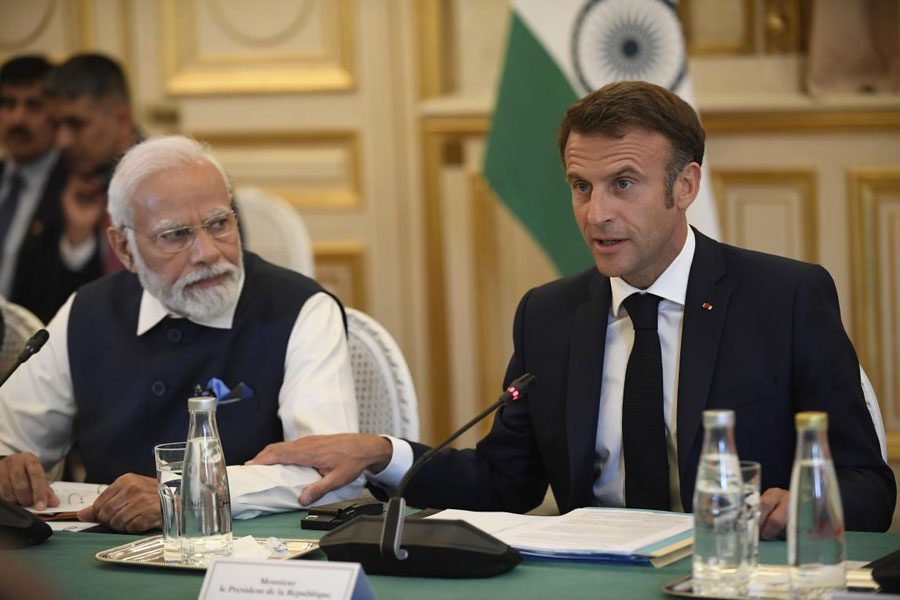India and France agreed to develop new generation military equipment as part of a long-term roadmap during Prime Minister Narendra Modi's visit to Paris, French Ambassador Emmanuel Lenain said on Tuesday.
At a media briefing, the envoy described the visit as a reflection of "trust and strong partnership" between the two countries.
India and France on Friday announced a raft of “ground-breaking” defence cooperation projects, including the joint development of jet and helicopter engines and the construction of three Scorpene submarines for the Indian Navy, following talks between Prime Minister Narendra Modi and French President Emmanuel Macron.
The two strategic partners also expressed commitment to cooperate in the co-development and co-production of advanced defence technologies, including for the benefit of third countries, a decision seen as a reflection of the growing bilateral defence ties.
There was no word on the much-anticipated procurement of 26 naval variants of Rafale fighter jets by India from France.
However, a document listing a 25-year roadmap to further advance the strategic relations mentioned the “timely delivery” of the 36 Rafale jets, which were procured by India from France for the Indian Air Force.
It said the two sides welcome an agreement inked between India’s Mazgon Dockyard Ltd and France’s Naval Group for the construction of three additional submarines under the P-75 programme.
The document titled “Horizon 2047: 25th Anniversary of the India-France Strategic Partnership, Towards A Century of India-France Relations” said the two sides are ready to explore more ambitious projects to develop the Indian submarine fleet and its performance.
“In line with their outstanding cooperation in military aviation spanning over five decades, India and France welcome the timely delivery of the 36 Rafale ordered by India,” it said.
“In the future, India and France will extend their ground-breaking defence cooperation in advanced aeronautical technologies by supporting the joint development of a combat aircraft engine,” it added.
A roadmap for this project will be prepared between Safran and the Defence Research and Development Organisation(DRDO) before the end of this year.
They also announced supporting industrial cooperation for the motorisation of heavy-lift helicopters under the Indian Multi-Role Helicopter [IMRH] programme with the Safran helicopter engine.
“To enable progress on the IMRH programme, a shareholders’ agreement between Hindustan Aeronautics Limited (HAL), India and Safran Helicopter Engine, France has been concluded for engine development,” the document said.
It said these ventures are in line with the spirit of trust that prevails between India and France in the sharing and joint development of critical components and technology building blocks, based on the successful Indo-French experience in technology transfer.
It mentioned that other examples of the defence industrial partnership included the contract being concluded between Safran Helicopter Engine and HAL for the transfer of technology of “forging and castings” for the Shakti engine.
“This is also reflective of the French commitment to support technology transfer and Make in India, it said.
Another such example is the MoU between Garden Reach Shipbuilders and Engineers Ltd and Naval Group France to collaborate in the field of surface ships that cater to fulfil the requirement of India and international naval forces, it added.
“To this end, both countries are also working towards adopting a roadmap on defence industrial cooperation,” it said.
In view of the uptick in defence industrial collaborations between the two countries, India is setting up a technical office of the DRDO at the Indian embassy in Paris.
India and France are long-standing strategic partners in the Indo-Pacific. Since the establishment of diplomatic relations between the two countries in 1947 and the upgrading of the partnership to the strategic level in 1998, our two countries have consistently acted together, building on a high level of mutual trust, shared commitment to the principles enshrined in the UN charter and common values rooted in international law.
Except for the headline, this story has not been edited by The Telegraph Online staff and has been published from a syndicated feed.










